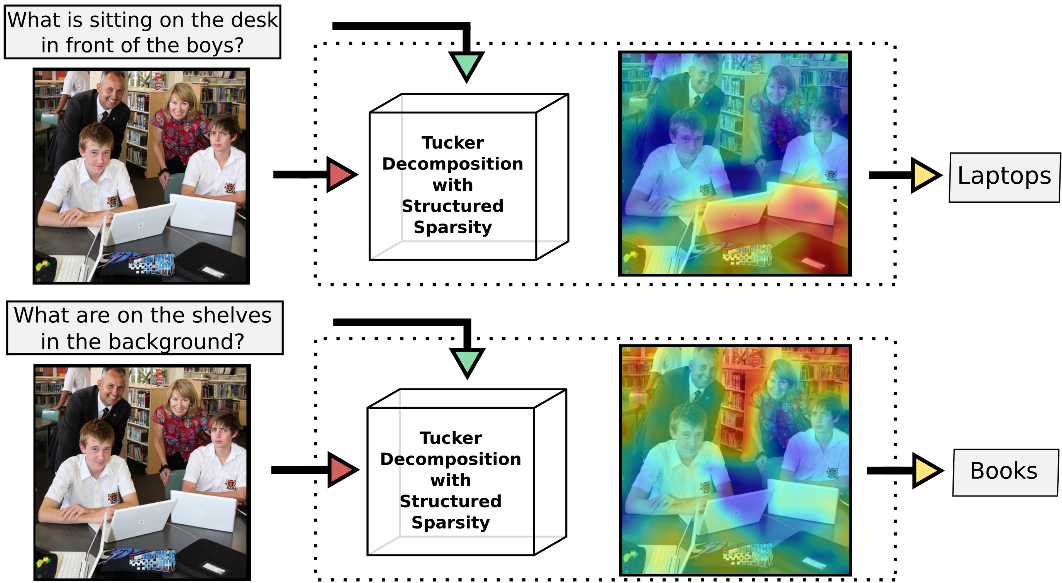Introspective Distillation (IntroD)
This repository is the Pytorch implementation of our paper "Introspective Distillation for Robust Question Answering" in NeurIPS 2021. The code will be released before the conference.
This repository is the Pytorch implementation of our paper "Introspective Distillation for Robust Question Answering" in NeurIPS 2021. The code will be released before the conference.
Covid-QA Fine tuned models for question answering on Covid-19 data. Hosted Inference This model has been contributed to huggingface.Click here to see
NExT-QA We reproduce some SOTA VideoQA methods to provide benchmark results for our NExT-QA dataset accepted to CVPR2021 (with 1 'Strong Accept' and 2
FeTaQA: Free-form Table Question Answering FeTaQA is a Free-form Table Question Answering dataset with 10K Wikipedia-based {table, question, free-form
CLIP-ViL In our paper "How Much Can CLIP Benefit Vision-and-Language Tasks?", we show the improvement of CLIP features over the traditional resnet fea
Path-Generator-QA This is a Pytorch implementation for the EMNLP 2020 (Findings) paper: Connecting the Dots: A Knowledgeable Path Generator for Common
CORA This is the official implementation of the following paper: Akari Asai, Xinyan Yu, Jungo Kasai and Hannaneh Hajishirzi. One Question Answering Mo
Bilinear Attention Networks This repository is the implementation of Bilinear Attention Networks for the visual question answering and Flickr30k Entit
Visual Question Answering in pytorch /!\ New version of pytorch for VQA available here: https://github.com/Cadene/block.bootstrap.pytorch This repo wa
This reporistory contains the test-dev data of the paper "xGQA: Cross-lingual Visual Question Answering".
Hello, Yu Lei, I would like to ask whether there should be two teacher models for the CSS part, and then predict the mixing. It seems that I don't see this part of the code in the code. Maybe I didn't notice. Can you tell me what this part of the code is.
Hello Yulei, thank you for your paper and code, which benefit me a lot. When I tried to run cfvqa, I may have encountered some problems due to my incorrect usage. I hope that you could answer them. After training the teacher model, the student model encountered the following error when loading the Optimizer:
[1m[90m[I 2022-12-04 22:48:30][0m ...fvqa/engines/engine.py.87: Loading last checkpoint
[1m[90m[I 2022-12-04 22:48:30][0m ...fvqa/engines/engine.py.395: Loading model...
[1m[90m[I 2022-12-04 22:48:30][0m ...fvqa/engines/engine.py.401: Loading optimizer...
[1m[90m[I 2022-12-04 22:48:30][0m ...qa/cfint1/cfvqa/run.py.120: Traceback (most recent call last):
File "/mnt/home/lxpvqa/cfint1/cfvqa/run.py", line 113, in main
run(path_opts=path_opts)
File "/mnt/home/lxpvqa/cfint1/cfvqa/run.py", line 92, in run
engine.resume()
File "/mnt/home/lxpvqa/cfint1/cfvqa/cfvqa/engines/engine.py", line 91, in resume
map_location=map_location)
File "/mnt/home/lxpvqa/cfint1/cfvqa/cfvqa/engines/engine.py", line 403, in load
optimizer.load_state_dict(optimizer_state)
File "/usr/local/lib/python3.6/dist-packages/block/optimizers/lr_scheduler.py", line 123, in load_state_dict
self.optimizer.load_state_dict(state['optimizer'])
File "/usr/local/lib/python3.6/dist-packages/torch/optim/optimizer.py", line 124, in load_state_dict
raise ValueError("loaded state dict contains a parameter group "
ValueError: loaded state dict contains a parameter group that doesn't match the size of optimizer's group
The run commands I used are as follows:
python -m bootstrap.run -o cfvqa/options/vqa2/smrl_cfvqa_sum.yaml
#mkdir ./logs/vqa2/smrl_cfvqaintrod_sum/
cp -r ./logs/vqa2/smrl_cfvqa_sum/ ./logs/vqa2/smrl_cfvqaintrod_sum/
python -m run -o ./cfvqa/options/vqa2/smrl_cfvqaintrod_sum.yaml
The following shows the contents of the optimizer in smrl_cfvqaintrod_sum:
optimizer:
import: cfvqa.optimizers.factory
name: Adam
lr: 0.0003
gradual_warmup_steps: [0.5, 2.0, 7.0] #torch.linspace
gradual_warmup_steps_mm: [0.5, 2.0, 7.0] #torch.linspace
lr_decay_epochs: [14, 24, 2] #range
lr_decay_rate: .25
Could you please tell me how to solve this problem? Thanks a lot.
Designing a Minimal Retrieve-and-Read System for Open-Domain Question Answering Abstract In open-domain question answering (QA), retrieve-and-read mec
Hurdles to Progress in Long-form Question Answering This repository contains the official scripts and datasets accompanying our NAACL 2021 paper, "Hur
MADE (Multi-Adapter Dataset Experts) This repository contains the implementation of MADE (Multi-adapter dataset experts), which is described in the pa
MADE (Multi-Adapter Dataset Experts) This repository contains the implementation of MADE (Multi-adapter dataset experts), which is described in the pa
TRAnsformer Routing Networks (TRAR) This is an official implementation for ICCV 2021 paper "TRAR: Routing the Attention Spans in Transformers for Visu
?? ERASOR (RA-L'21 with ICRA Option) Official page of "ERASOR: Egocentric Ratio of Pseudo Occupancy-based Dynamic Object Removal for Static 3D Point C
FunMatch-Distillation TF2 implementation of knowledge distillation using the "function matching" hypothesis from the paper Knowledge distillation: A g
QA-GNN: Question Answering using Language Models and Knowledge Graphs This repo provides the source code & data of our paper: QA-GNN: Reasoning with L
GrailQA is a new large-scale, high-quality KBQA dataset with 64,331 questions annotated with both answers and corresponding logical forms in different syntax (i.e., SPARQL, S-expression, etc.). It can be used to test three levels of generalization in KBQA: i.i.d., compositional, and zero-shot.
BPR Binary Passage Retriever (BPR) is an efficient neural retrieval model for open-domain question answering. BPR integrates a learning-to-hash techni



